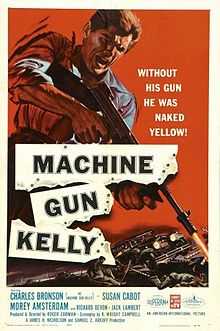Machine-Gun Kelly (film)
| Machine-Gun Kelly | |
|---|---|
 | |
| Directed by | Roger Corman |
| Produced by | Roger Corman |
| Written by | Robert Wright Campbell |
| Starring |
Charles Bronson Susan Cabot Morey Amsterdam Jack Lambert |
| Music by | Gerald Fried |
| Cinematography | Floyd D.Crosby |
| Editing by | Ronald Sinclair |
| Studio | American International Pictures |
| Distributed by | Allied Artists |
| Release dates | 1958 |
| Running time | 80 min. |
| Country | United States |
| Budget | $100,000[1] |
Machine-Gun Kelly (1958) is a film directed by Roger Corman, chronicling the criminal activities of the real-life George "Machine Gun" Kelly. The film was considered low budget, but received good critical reviews.[2] The film was the first lead role for actor Charles Bronson.
Following the 1967 success of Bonnie and Clyde, American International Pictures rereleased the film as a double feature with The Bonnie Parker Story.
Plot
George Kelly (Charles Bronson), dubbed "Machine Gun" by his partner in crime Flo Becker (Susan Cabot) because of his obsession with that weapon, pulls off a bank robbery and eventually becomes Public Enemy Number One. Discord grows among his inner circle, and Kelly, deathly afraid of being jailed or killed, is dominated and ridiculed by the tough-talking Flo.
A botched robbery causes one of their partners, Michael Fandango (Morey Amsterdam) to lose an arm. Kelly, goaded on by Flo, kidnaps the daughter of a wealthy businessman for ransom. Fandango fingers him to the police, but is killed by one of Kelly's gang as the house is surrounded.
Kelly intends to surrender, if only to receive a more lenient sentence and avoid execution. Flo again questions his nerve, whereupon Kelly slugs her with his fist, knocking her unconscious. Both are taken away to jail.
Cast
- Charles Bronson as George R. 'Machine Gun' Kelly
- Susan Cabot as Florence 'Flo' Becker
- Morey Amsterdam as Michael Fandango
- Richard Devon as Apple
- Jack Lambert as Howard
- Frank DeKova as Harry
- Connie Gilchrist as 'Ma' Becker
- Wally Campo as Maize
- Barboura Morris as Lynn Grayson
- Lori Martin as Sherryl Vito (as Dawn Menzer)
- George Archambeault as Frank
- Robert Griffin as Mr. Andrew Vito
- Michael Fox as Detective Clinton
- Larry Thor as Detective Drummond
- Shirley Falls as Martha
Notes
The film was the first lead role for actor Charles Bronson who would later be acclaimed for roles in Once Upon a Time in the West, The Magnificent Seven, and the Death Wish series. Susan Cabot was the female lead, as part of her agreement with director Roger Corman, for whom her roles would be the end of her film career.
The film had an estimated budget of $100,000.[3]
References
- ↑ Samuel Z Arkoff & Richard Turbo, Flying Through Hollywood By the Seat of My Pants, Birch Lane Press, 1992 p 77
- ↑ "Machine Gun Kelly: Review".
- ↑ "Box office / business for Machine-Gun Kelly".
External links
- Machine-Gun Kelly at the Internet Movie Database
- Machine-Gun Kelly (film) at allmovie
- Machine-Gun Kelly (film) at the TCM Movie Database